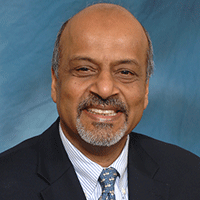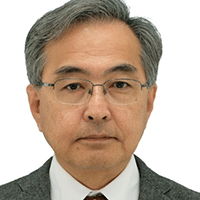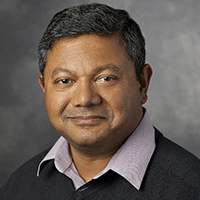2020 AIChE-ASME Donald Q. Kern Award Lecture
Wednesday, June 16, 11:35am – 12:35pm

Raj M. Manglik, PhD, ASME Fellow
Professor of Mechanical and Materials Engineering
Thermal-Fluids & Thermal Processing Laboratory, University of Cincinnati, Cincinnati, OH
Lecture Title: The Legacy of Donald Q. Kern Redux: Imperative of Energy Conservation and Enhancement of Process Heat and Mass Transfer
Abstract: The imperatives of sustainability warrant the mitigation of both energy consumption and environmental degradation. The efforts to achieve these goals are perhaps most acutely underscored by the need for not only conserving primary energy resources, but also their conversion, utilization, and recovery in every industrial, commercial, and domestic application. This energy crisis has become a subject of considerable present-day debate with enormous economic and political implications. However, the primary problems in conversion and conservation, which inherently involve a heat and/or mass transport process, have several viable engineering solutions, particularly with the use of enhancement techniques. Heat and mass transfer in the process industry and the pioneering work of Donald Q. Kern has become acutely important, and its reiteration provides unique antecedent insights. This presentation delineates the development and applications of enhancement devices and methods, which have driven significant technological changes in the past and continue to do so in contemporary times. Some specific examples of innovative and transformational engineering science in, single-phase flow convection, phase-change processes with boiling, and spray-droplet engendered mass transfer are highlighted. Their implementation directly contributes to increased heat/mass exchanger performance, thereby effecting energy, material, and cost savings, as well as a consequential mitigation of environmental degradation – or a pathway toward sustainability of both our energy-driven economy and our environment. Moreover, general current trends in the field as well as reflections on significant contributions from the past and their impact on future thermal processing excursions are delineated.
Bio: Dr. Raj M. Manglik, Professor of Mechanical Engineering and Director, Thermal-Fluids & Thermal Processing Laboratory at the University of Cincinnati, is a Fellow of ASME and ASHRAE, Senior Member of AIChE, and member of Sigma Xi and Tau Beta Pi. He received his Ph.D. from Rensselaer Polytechnic Institute, M.S. from Iowa State University, and B.Tech. from the Indian Institute of Technology – Madras, all in Mechanical Engineering. He has served as a two-term Associate Editor as well as Guest Editor of ASME Journal of Heat Transfer, and Editor-in-Chief of the Journal of Enhanced Heat Transfer. He has published more than 260 archival papers and technical reports, and has given numerous keynote and plenary lectures at a variety of national and international forums. He has also published 15 highly acclaimed books, monographs, and book chapters, including the classical textbook Principles of Heat Transfer (7th and 8th Eds., Cengage) and the monograph Plate Heat Exchangers: Design, Applications and Performance. His research expertise spans a broad spectrum of thermal science and engineering, and he is a leading international expert on interfacial phenomena, boiling heat transfer, bubble dynamics and droplet-spray transport processes, thermal processing of polymeric materials and non-Newtonian flows, enhancement of heat transfer, compact and high-performance heat exchangers, and waste-heat recovery and energy systems. He has been the recipient of the very first CAREER Award (1995) from the National Science Foundation, ASME Melville Medal (2006) for the best original scientific contribution, the ASME HTD 75th Anniversary Medal (2013), Heat Transfer Memorial Award (2016), and the Potter Gold Medal (2018), among many other research and teaching awards.
2021 SHTC Plenary Lecture
Friday, June 17, 11:00am – 12:00pm

Yasuyuki Takata, Deng
Professor, Department of Mechanical Engineering
International Institute for Carbon-Neutral Energy Research (WPI-I2CNER), Kyushu University
Lecture Title: On the Quench of Spray Cooling: When Does it Occur?
Abstract: It is of great importance for water spray cooling of hot steel to predict “quench point” where rapid cooling occurs by the direct contact between liquid and hot surface. Despite a number of previous studies, the mechanism of onset of quench has not yet been clearly understood. One of the reasons is due to the oxide layers formed on the hot surface. These oxide layers has non-uniform porous structure and low thermal conductivity and hence increase the quenching temperature. In the present study, we try to explain the quenching temperature based on the assumption of the transient heat conduction for a contact between two semi-finite bodies. We used several different artificial oxide layers and made a series of experiments on spray cooling and observation of single individual droplet impinging onto the hot oxide surfaces. As a result, the onset of quench always seems to happen at the contact surface temperature of around 250°C regardless of the composition and thickness of the oxide layer.
Bio: Yasuyuki (Yas) Takata is Professor of Thermofluid Physics in the Department of Mechanical Engineering and a Principal Investigator of the International Institute for Carbon-Neutral Energy Research (WPI-I2CNER), Kyushu University, Japan. His research area covers liquid-vapor phase change heat transfer, especially the effect of surface wettability and nano-micro structure on pool boiling and spray cooling, heat transfer devices, and thermophysical properties of hydrogen, as well as a database of thermophysical properties of fluids. He received a number of awards such as The JSTP Best Paper Award in 2010, Heat Transfer Society Award for Scientific Contribution in 2002, and JSME Thermal Engineering Achievement Award in 2010, JSME Thermal Engineering Award for International Activity in 2018, ASME ICNMM2018 Outstanding Leadership Award in 2018 and ATPC Significant Contribution Award in 2019. He served as a head of Thermal Engineering Division and executive board director of the Japan Society of Mechanical Engineers (JSME), the President of the Heat Transfer Society of Japan (HTSJ) and the President of the Japan Society of Thermophysical Properties (JSTP). He is currently the President of Asian Union of Thermal Science and Engineering (AUTSE) since November 2020. He is a Council Member of the Science Council of Japan since October 2020.
Max Jakob Award Plenary Lecture
Wednesday, June 16, 10:15am – 11:15am

Arun Majumdar
Department of Mechanical Engineering, Stanford University
Department of Photon Science, SLAC
Lecture Title: Energy, Mass and Charge Transfer at the Extremes
Abstract: This talk will present research conducted in our and other laboratories on transport phenomena and phase transformations that are relevant for and influenced by the extremes of small and large scales.
Small: Energy, mass and charge transport in solids, liquids and gases as well as transitions between phases are characterized by physical length scales, often in the range of 0.1-100 nm. Examples include the wavelength and mean free path of molecules, electrons, phonons and photons and Debye length of ions. When matter is constrained in one, two or three dimensions and overlap these characteristic length scales, the underlying science is manifested in ways that cannot be observed at macroscales. Furthermore, new devices and systems can be engineered to utilize these unique nanoscale phenomena in novel ways. This talk will provide examples of new scientific understanding as well as new engineered devices related to energy, mass and charge transport achieved via low-dimensional confinement.
Large: One of the defining issues of the 21st century is climate change. Addressing it will require a new paradigm for the global energy system that is based on increased energy efficiency, zero-carbon electricity and fuels, and CO2 management at the Gigaton scale, making it a stark departure from the 20th century paradigm that is unsustainable. Highlighting thermal science and engineering challenges, this talk will discuss new approaches in chemical transformations that have the potential to scale to the Gigaton levels, and offer the promise to massively decarbonize the energy system. These include new approaches to thermochemical hydrogen production with no CO2 emissions as well as separation and reactions involving CO2 that are sufficiently energy efficient and cost effective to enable scaling to the Gigaton scales.
Bio: Dr. Arun Majumdar is the Jay Precourt Provostial Chair Professor at Stanford University, a faculty member of the Department of Mechanical Engineering. From 2009 to 2012 Dr. Majumdar served as the Founding Director of ARPA-E and from March 2011 to June 2012 as the Acting Under Secretary of Energy. After leaving Washington, Dr. Majumdar was the VP for Energy at Google. Dr. Majumdar is a member of the National Academy of Sciences, National Academy of Engineering and the American Academy of Arts and Sciences. He also served as the Vice Chairman of the Advisory Board to the US Secretary of Energy, Dr. Ernest Moniz, was a Science Envoy for the US Department of State, and serves on the advisory board of numerous energy businesses and non-profits. Dr. Majumdar received his BS in Mechanical Engineering in 1985 from the Indian Institute of Technology, Bombay, and his Ph.D. from the University of California, Berkeley in 1989.